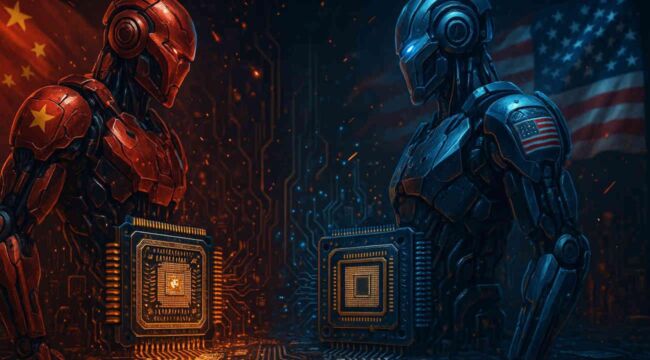China’s “Manhattan Project”
Tech stocks have staged an impressive comeback since their recent mini-crash.
Is the dip over? Back to normal, with the Mag 7 once again taking center stage?
Not so fast.
American tech stocks face a number of challenges which could stop a new bull market in its tracks.
The risk we’re going to discuss today is the possibility of another surge in Chinese AI technology.
You may recall that earlier this year the release of Chinese AI model DeepSeek R1 caused quite a stir. R1 was the first state-of-the-art “reasoning” AI model which was open source, meaning it was free for anyone to use or modify.
DeepSeek R1 was trained on a budget about 95% smaller than a typical American model. So this naturally caused concern about demand for NVIDIA’s AI chips (nearly all leading AI models are built using NVIDIA chips).
After the release of R1, NVIDIA (NVDA) shares crashed from over $147 down to $118 in just a few days. Shares briefly dipped below $100, and currently trade around $114, so still haven’t fully recovered.
DeepSeek R2: Coming Soon
DeepSeek R1 rocked the world. The prior assumption that China is years behind in AI technology was forgotten. It became clear that DeepSeek has a cutting-edge team and is breaking new ground.
And despite the AI chip restrictions placed on China, they had figured out how to make competitive models anyway.
DeepSeek’s next major model, R2, will likely be released in the next few weeks. It will certainly be a major improvement from R1. And that’s a disturbing thought for American tech firms.
There are a few ways in which R2 could be a major shock to the U.S. tech system.
R1 was a major technological breakthrough, but it was still trained on American NVIDIA AI chips.
What if R2 is trained on Chinese AI hardware? China’s leading AI chip maker, Huawei, has made major advances in recent months, and is catching up to NVIDIA.
Reuters recently reported that NVIDIA met with U.S. lawmakers to discuss the rising threat of Huawei. Here’s Reuters:
Nvidia CEO Jensen Huang discussed concerns about Huawei Technologies Co.’s growing artificial intelligence capabilities with U.S. lawmakers, according to a senior congressional committee staff source.
The issues were raised during a closed-door meeting between Nvidia executives and the U.S. House of Representatives Foreign Affairs Committee on Thursday. Among the topics discussed were Huawei’s artificial intelligence chips and how restrictions on Nvidia’s chips in China could make Huawei’s chips more competitive.
“If DeepSeek R1 had been trained on (Huawei chips) or a future open-source Chinese model had been trained to be highly optimized to Huawei chips, that would risk creating a global market demand for Huawei chips,” the senior staff source said.
Meanwhile, NVIDIA founder and CEO Jensen Huang was recently in China and made the case that China is “not behind” in AI. He also called Huawei “one of the most formidable technology companies in the world”.
This is the type of honesty required to face China as a rising competitor. We underestimate the country at our own peril. As Huang recently noted, 50% of the world’s AI researchers are Chinese.
For years now, the U.S. has been restricting the flow of American and European semiconductor tech to China. This has led directly to China launching a Manhattan Project sized effort to build their own capabilities.
In May of 2023 NVIDIA CEO Huang warned that “If [China] can’t buy from … the United States, they’ll just build it themselves.”
Now we’re seeing this play out in real-time.
DeepSeek R2 will be released in the near future. If it turns out to be a breakthrough model built on Chinese AI hardware, be prepared for a double shock to American tech firms.
DeepSeek R1 signaled the end of America’s monopoly on state-of-the-art AI models. A DeepSeek R2 built on Huawei hardware would also signal the end of NVIDIA’s monopoly on deep-learning chips. And if R2 isn’t built on Chinese hardware, my guess is that R3 will be.
Don’t get me wrong, NVIDIA, and other American tech firms, will maintain big market shares going forward.
But in NVIDIA’s case, going from 98% to 70% market share in AI training would be a severe shock. Additional competition means less pricing power, lower profit margins, and a lesser network effect.
In other words, it could derail one of the greatest stock runs of all time.
We’ll keep an eye on this story and report back with any major updates.
Have a great weekend, everyone.



Comments: